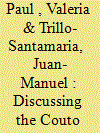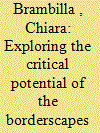| Srl | Item |
| 1 |
ID:
138969


|
|
|
|
|
| Summary/Abstract |
The assumption that the border between Spain and Portugal is a stable one since medieval times is commonplace. Thus, the territorial trap conception, as defined by John Agnew, dominates understanding of this border. This paper will focus on a specific border area, the Couto Mixto, in an effort to contest this territorial trap. Furthermore, using some of the emerging border studies concepts, mainly borderscapes and border poetics, this research will discuss how this particular territory has been recently recovered and recreated. The theoretical underpinnings are followed by an analysis of what the Couto was and how it has been reappropriated in narrative terms in the last twenty years. The paper concludes by discussing the empirical findings on the Couto in light of the theoretical sections. It is eventually suggested that tourism based on specific immaterial border legacy could encourage Couto’s inhabitants and the precarious economy of the area.
|
|
|
|
|
|
|
|
|
|
|
|
|
|
|
|
| 2 |
ID:
138967


|
|
|
|
|
| Summary/Abstract |
The conceptual evolution of borders has been characterised by important changes in the last twenty years. After the processual shift of the 1990s (from border to bordering), in recent years there has been increasing concern about the need to critically question the current state of the debate on the concept of borders. Within this framework, this article explores the critical potential of the borderscapes concept for the development of alternative approaches to borders along three main axes of reflection that, though interrelated, can be analytically distinguished as: epistemological, ontological and methodological. Such approaches show the significant potential of borderscapes for future advances of critical border studies in the era of globalisation and transnational flows, thereby contributing to the liberation of (geo)political imagination from the burden of the ‘territorialist imperative’ and to the understanding of new forms of belonging and becoming that are worth being investigated.
|
|
|
|
|
|
|
|
|
|
|
|
|
|
|
|